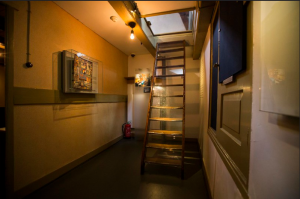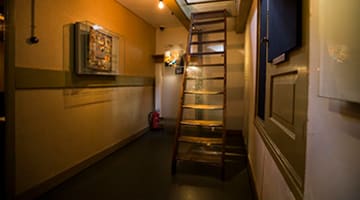It was the infamous bookcase to the secret annex that got me.
 On a recent trip to Amsterdam, my husband and I visited the Anne Frank House. We had been at the Jewish Historical Museum and the Portuguese Synagogue and then sprinted across a filled-with-life Amsterdam, arriving at the appointed time to queue with others who held tickets for the same time slot. Things are so well-organized that there was almost no wait.
On a recent trip to Amsterdam, my husband and I visited the Anne Frank House. We had been at the Jewish Historical Museum and the Portuguese Synagogue and then sprinted across a filled-with-life Amsterdam, arriving at the appointed time to queue with others who held tickets for the same time slot. Things are so well-organized that there was almost no wait.
Visiting the Anne Frank House fulfilled a lifelong dream for me. Most likely, I was 11 or 12 years old when I read her diary. Growing up in suburbia as a second generation American whose family came to this country in the early 20th century, I had no “firsthand” connections to the Holocaust.
I remember asking myself and my parents, “How could this happen?” Actually, I was more focused on wondering how people survived. In addition to The Diary of Anne Frank, I consumed Mila 18, QB VII, Night and other such genre. Several teachers at the Maimonides School in Boston, which my brothers and I attended, barely escaped to these shores where they recreated themselves. They spoke about life prior to 1939. Very little was said about the war years.
Anne Frank’s diary gripped me.
Precocious, full of life, brimming with energy, she and seven others were confined to three rooms and life of silence during work hours so people working in the building would not hear them. Once a week, she bathed herself in some kind of tin container. Forget ever being outdoors, day or night. There was the constant fear of being discovered despite the blackout curtains. Eight people lived together, fought, made up, spoke quietly and yearned for freedom and life.
Anne Frank was gutsy, outspoken and curious with a joie de vivre. My gut feeling is she was wired this way and remained so, despite the circumstances. Now that I am a mother and a grandmother and settled into my “middle years,” I appreciate the uniqueness of the individual personality, growth and the not-always-so-straight road to forming identity. Her diary makes you wonder what could have been her life had not the Nazis cast their giant dark shadow and life-choking grip.
Stepping past the bookcase on hinges – the very artifact that helped to hide the Frank family and others – and into the annex, I realized that we were walking in the footsteps of others who walked the very same steps and had been filled with fear and hope. Fear is obvious: would they live? Hope is obvious: they hoped to live. Our lives today are thankfully not so black-and-white, so stark, so on the edge. Both my husband and I bumped our heads on the low-hanging doorframe, something that Anne Frank had also done and wrote about.
The staircases, oh those staircases. There are several staircases in the Anne Frank house. Narrow, they are more akin to ladders than staircases as they are close to being 90-degree angles from the floor. The steps in the staircases are also narrow which cause one to climb them at a funny angle. Otto Frank created the Secret Annex during crazy times and those staircases are yet one more reminder thereof.
Adjacent to the Secret Annex is the museum where the story of the raid of the annex is told as well as the details of post-Annex life (and death) for the inhabitants. A film with celebrities spanning the spectrum from Shimon Peres to Whoopi Goldberg speaks about how Anne Frank’s legacy impacted their lives. Of course, there is Anne Frank’s diary under glass, together with her father’s explanation of how an employee saved it after the raid. Her mother’s siddur is also on display.
There is a scene in Leon Uris’ Mila 18 which has been formative for me about the importance of the primary source, of contemporaneously writing and detailing life with its trials, tribulations and rewards. A twisted high-ranking Nazi official named Horst von Epp watches the burning of the Warsaw Ghetto from the confines of a luxurious apartment. He speaks about his fear of “Jewish retribution” which he explains that, despite his not having evidence, he is confident that the Jews have diarized the macabre so-called life in the Warsaw Ghetto. He is fearful of the writings being found and brought to life even after the deaths of their authors and how their voices, despite their deaths, will be the undoing of the Third Reich.
Von Epp was right to be afraid of the power of the written word.
The obsessive Nazis detailed the names of Jews and others who were sent from Amsterdam to their final fates and on which dates. Interestingly, there are a fair number of people with the surname “Frank” and there was more than one Anne Frank. Yet the Anne Frank we know practically jumps out of that list. Amazingly, through her enduring diary and its timeless content, she achieved the status of famous writer she so yearned for during her too brief lifetime.
Such is the power of the written word and even more so when it’s “emet.”
The words of this author reflect his/her own opinions and do not necessarily represent the official position of the Orthodox Union.
